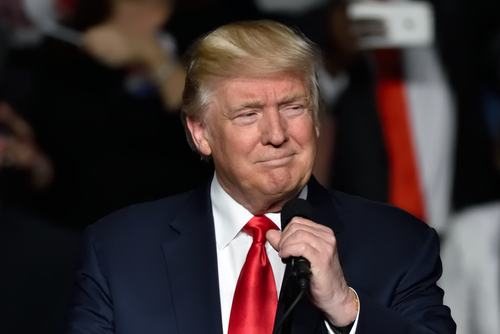On the day Robert F. Kennedy Jr. endorsed Donald Trump for president, both candidates vowed to tackle chronic health problems and expose corruption within the U.S. health and food industries. Watching their joint announcement, health and wellness influencer Courtney Swan admitted she “full blown sobbed.”
“Oh God, I’m getting emotional just thinking about it,” Swan shared in an interview with The Daily Wire. “I have been waiting my entire adult voting life for a presidential candidate to acknowledge how sick our country is.”
Swan, who runs the popular Instagram account “realfoodology” with nearly 400,000 followers, isn’t alone in her feelings. Many influencers with similar followings have noticed heightened interest from their audiences in the Trump-Kennedy alliance, particularly in their commitment to addressing America’s food issues.
This new wave of support isn’t coming from Trump’s usual base. These followers are more focused on health, wellness, and nutrition, and many of them have never voted Republican. But the pandemic changed things. Health officials discouraged exercise, pushed for mask mandates, and encouraged vaccinations, leading many Americans to question official advice.
Kennedy gained popularity among these skeptics by criticizing seed oils, processed foods, and the influence of Big Food and Big Pharma. Now, with Kennedy endorsing Trump, these voters find themselves considering a candidate they might not have before.
“I’ve been registered independent pretty much my whole life,” said Iliriana Balaj, founder and CEO of the “low tox” shop LiveHealthillie. “This is probably the first year where someone is finally talking about what America really needs right now: real health and wellness and bringing down the biggest corporations that have monopolized everything.”
Balaj believes female voters, in particular, might be drawn to a candidate who emphasizes health and wellness. “Women are the ones buying the food… they’re the ones reading labels and being marketed to,” she explained.
Trump seems eager to expand his voter base to include these “crunchy” health enthusiasts, even adopting a new slogan: “Make America Healthy Again.”
According to the Centers for Disease Control and Prevention (CDC), chronic diseases like diabetes, cancer, and heart disease are the leading causes of death in the U.S. and drive much of the country’s $4.5 trillion annual healthcare costs. Statistics indicate nearly 30% of American teens are prediabetic, over 18% of young adults have nonalcoholic fatty liver disease, and cancer rates among young people are climbing.
“Six out of 10 adults in America are living with a chronic illness,” Kennedy wrote in a recent Wall Street Journal piece. “Seventy-four percent of American adults are overweight or obese. Rates of kidney disease and autoimmune conditions are going up. Cancer rates among young people are rising… U.S. life expectancy is markedly lower than in every other developed country.”
As more Americans become aware of these troubling health trends, figures like Kennedy and fitness expert Jillian Michaels are speaking out against misleading nutritional information and the presence of ultra-processed foods filled with harmful ingredients.
“Our chronic sick condition is putting our country at risk,” warns Swan.
Some influencers, like Carnivore Aurelius, argue that a healthier lifestyle involves eating whole foods, avoiding seed oils, and getting ample sunshine. Meanwhile, “Big Food” is reportedly preparing for a fight, defending the need for processed foods amid concerns about increased food waste and costs.
Trump’s focus on chronic health issues isn’t new. In June, he released a video outlining his plans to address chronic illnesses, particularly among children, and questioned whether “Big Pharma” is profiting from these health challenges.
“It is time to ask: What is going on?” Trump said. “Is it the food that they eat? The environment that we live in? The over-prescription of certain medications? Is it the toxins and chemicals that are present in our homes?”
Upon accepting Kennedy’s endorsement in Arizona on August 26, Trump praised Kennedy’s “decades of work as an advocate for the health of our families and our children,” promising to establish a panel of experts to investigate the rise in chronic health problems.
Karoline Leavitt, Trump’s national press secretary, stressed that Trump is “extremely aware” of the health crisis and plans to create a special commission to investigate the root causes of the increase in chronic illnesses. “President Trump will keep his promise to make America affordable and healthy again,” she stated.
Kennedy’s endorsement has had a significant impact, particularly among voters who previously considered themselves politically independent or aligned with the Democratic Party. “I voted blue my entire life. This is a huge turning point for me,” said Swan, describing the Trump-Kennedy alliance as a “game changer.”
Kennedy’s endorsement has energized wellness influencers and their followers. Alex Clark, host of the “Culture Apothecary” podcast, noted a surge in female enthusiasm for Trump after Kennedy’s announcement, saying, “People are now more aware than ever of just how dire a need we have for real solutions and advocacy around these topics.”
Max Lugavere, a health author with 1.2 million Instagram followers, observed that people are tired of being misled by the media and are eager for real change. “What gives me hope is the campaigning that RFK has done… and the fact that he now seems to have the ear of Donald Trump,” he said.
As more Americans question the mainstream narratives around health and nutrition, the alliance between Trump and Kennedy appears to be resonating with a new segment of voters, sparking what some are calling a health and wellness revolution.
“There’s a movement happening,” said Swan. “Many people are writing to me, saying, ‘I voted blue my whole life. Now, I’m changing course.’”






